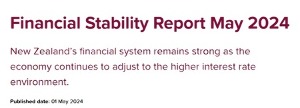
RBNZ said it is currently reviewing submissions from its latest round of consultation and will announce its decision on DTI and loan-to-valuation-ratio (LVR) restrictions “around the middle of the year.”
Initially, RBNZ expects DTI restrictions are unlikely to affect most borrowers and that their introduction could allow the regulator to reduce LVRs.
“By activating DTI restrictions when the market is relatively subdued, it is likely that they will not be binding initially for most borrowers,” it said.
“Instead, DTI restrictions are intended to protect against increases in risky lending, especially when interest rates decline.”
While house prices have risen a little, they remain within sustainable levels, RBNZ said.
It noted that while financial markets have priced in lower interest rates over the next year, “there remains a risk that new or persistent inflation pressures could mean global interest rates remain restrictive for longer, placing continued pressure on households, businesses and the financial system.”
The FSR said most mortgage borrowers have rolled onto much higher interest rates and that we are now about 85% through the process to its projected peak – that's up from its 80% estimate in February.
“Only around 10% of mortgage lending remains on fixed rates below 4%,” it said.
The peak rate has increased to 6% from a low of 2.8% in 2021 and it will likely continue to increase to about 6.5% at about the end of this year.
“To date, the impacts of higher interest rates on the financial system have been more benign than generally expected,” RBNZ said.
“This is despite higher interest rates contributing to reduced economic activity, subdued credit growth across sectors, and house prices falling by around 15% between late 2021 and early 2023,” it said.
Mortgage arrears are rising from very low levels to about 0.5% of mortgages from 0.2% in 2022 and are expected to rise to about 0.7% by about the end of this year, but that will be just half the level experienced in the global financial crisis, it said.
“Arrears are expected to rise as some borrowers continue to roll onto even higher mortgage rates, albeit with the bulk of the transition already complete,” the FSR said.
“The impact of higher debt-servicing costs is also often only fully realised after some time as a strained borrower exhausts savings and other buffers.”
Borrowers have been able to cope by reducing the amount of principal they repay or by moving to interest-only payments, but the share of interest-only mortgages has remained flat at historically low levels, RBNZ said.
A softening labour market is likely to lead to increasing arrears but very few households are in a position of negative equity.
The FSR noted that non-bank deposit takers continue to face “scale and profitability challenges.”




